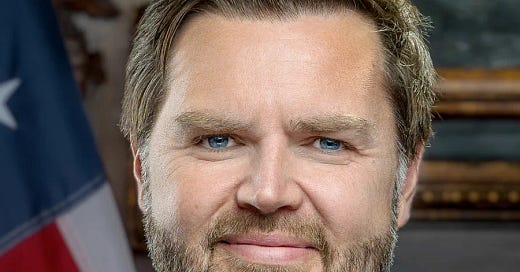Part of a the Trump’s Circle Series
Trump’s Connection to JD Vance
J.D. Vance’s relationship with Donald Trump has transformed dramatically over the past decade. In 2016, Vance was a self-described “Never Trump guy” who called Trump “reprehensible” and even mused privately that Trump could be “America’s Hitler” (POLITICO) (Reuters). Despite this bitter start, by 2022 Vance had reinvented himself as one of Trump’s staunchest loyalists. His public about-face – from harsh critic to avid supporter – earned Trump’s trust and ultimately led Trump to tap Vance as his running mate in 2024 (Reuters).
Why Trump Chose Vance: Advisors say Trump viewed Vance’s transformation as genuine, not opportunistic (Reuters). Vance’s ideology – an “America First” blend of economic populism and foreign-policy isolationism – dovetailed with Trump’s own agenda and clashed with the old GOP establishment of hawks and free-traders (Reuters). Most importantly, Vance had demonstrated unquestioning loyalty. He endorsed Trump early for 2024 (in January 2023) and consistently echoed Trump’s claims about the 2020 election (The Guardian) (Reuters). In one vice-presidential debate exchange, Vance pointedly refused to say Trump lost in 2020, instead insisting “big tech rigged the election” in Trump’s disfavor. Such statements signaled to Trump that Vance would be a “loyal soldier” in any circumstance (The Guardian) – a crucial factor after Trump’s fallout with former VP Mike Pence over the election certification. Indeed, Vance openly stated he would have entertained alternate electors on Jan. 6, 2021, if he’d been in Pence’s place (WSJ) (The Guardian).
Beyond loyalty, Trump calculated Vance could be an asset with key voter blocs. Vance’s Hillbilly Elegy fame and Rust Belt roots gave him credibility with the white working-class voters central to Trump’s base (Reuters). Some of Trump’s advisers argued Vance would “boost [Trump’s] Rust Belt bona fides” in critical swing states like Ohio, Pennsylvania, and Michigan (Reuters). Trump himself noted Vance’s compelling personal story – a Marine veteran and Yale Law graduate raised by his grandmother – believing it could broaden the ticket’s appeal (POLITICO) (The New Republic). Vance also brought fundraising connections that benefited Trump. In mid-2023, Vance helped organize a $12 million Silicon Valley fundraiser for Trump, leveraging relationships with tech magnates Peter Thiel, David Sacks, and others (CBS News) (Reuters). This ingratiated him further with Trump’s inner circle.
Trump’s Use of Vance: Since becoming vice president, Vance has been a vigorous surrogate and strategist for Trump. He often acts as Trump’s emissary to key constituencies – for example, speaking at a national Catholic forum to defend Trump’s foreign policy in religious terms (NY Post). Trump has deployed Vance to bolster the administration’s stance on contentious issues like Ukraine (where Vance has taken a harder line than many Republicans, as discussed below). Internally, Vance is considered one of Trump’s closest advisers in the White House. With his Ivy League polish and media savvy, he’s become an articulator of Trumpism – translating Trump’s rougher instincts into policy proposals and talking points. Trump himself has lauded Vance as “a good choice,” acknowledging he “took a little heat” initially for picking someone so polarizing, but is pleased that Vance has validated the decision (Reuters). In short, Trump values Vance as a loyal lieutenant who can both amplify Trump’s agenda and lend it an air of intellectual legitimacy.
Past Links to Russia
Scrutiny has grown over any ties – real or perceived – between J.D. Vance and Russia’s Vladimir Putin. No evidence of direct personal links has emerged; Vance has not been shown to have business dealings or meetings with Russian operatives. However, his policy stances and rhetoric have frequently aligned with Kremlin interests, drawing pointed criticism from U.S. allies and even Putin’s foes.
As a Senate candidate and now vice president, Vance has been an outspoken opponent of U.S. aid to Ukraine during Russia’s ongoing invasion. In early 2022, he infamously declared, “I don’t really care what happens to Ukraine one way or another,” arguing domestic issues deserved more attention (NY Post). He later advocated for forcing Kyiv into concessions, telling CNN in 2023 that “Ukraine is going to have to cede some territory to the Russians” – a position sharply at odds with both Ukraine’s and bipartisan U.S. policy (NY Post). Not surprisingly, Ukrainian President Volodymyr Zelensky bristled, labeling Vance “too radical” for urging an end to aid (NY Post).
Within weeks of taking office, Vice President Vance continued to press Trump’s ambivalent approach to Ukraine. He defended Trump’s push for a negotiated peace, insisting it was about “saving lives” and even casting it as a Christian duty (NY Post). In doing so, Vance positioned himself as a chief advocate for a swift settlement with Moscow. He has avoided condemning Putin in stark terms. During the 2024 campaign, Vance refused to call Putin an “enemy,” arguing it’s “counterproductive” to use such language and that while “Russia is a U.S. adversary,” the U.S. must be careful not to stumble into war with Moscow (AP News). He stressed wanting to “wind down” the war diplomatically if Trump returned to power (AP News).
Keep reading with a 7-day free trial
Subscribe to Morning Truth to keep reading this post and get 7 days of free access to the full post archives.





